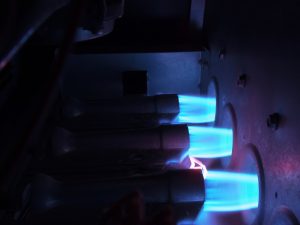 Do you know anyone in Portland, OR with a boiler? It’s not like they’re impossible to find, but they’re not all too common, either. Instead, you’ll find that forced-air heaters are much better suited to the needs of a typical Portland homeowner. They’re quite effective and don’t require a huge sum of money to install.
Do you know anyone in Portland, OR with a boiler? It’s not like they’re impossible to find, but they’re not all too common, either. Instead, you’ll find that forced-air heaters are much better suited to the needs of a typical Portland homeowner. They’re quite effective and don’t require a huge sum of money to install.
Of course, even forced-air heaters vary amongst each other, on everything from price to function. We’ll help clear the air on the differences, so you can make a more informed installation or replacement when that time comes.
Furnaces
Furnaces are the most common kinds of forced-air heating systems—and for good reason. They’re easy to install, don’t cost a fortune, and they get the job done. It’s not unlikely that you own a furnace because it was already installed in your home.
Furnaces use gas burners to generate heated air, which is then blown into your home through a series of ducts. Ducts are one of the most efficient ways to get air to every room in your home, but you have to take care to have them maintained and cleaned every year. Over time, the sealant holding the ducts can wear out, leading to inefficiencies.
Heat Pumps
Heat pumps are an entire category of heaters—and air conditioners, for that matter. They’re beloved systems because they can either heat or cool the air, all with the flip of a switch, allowing them to be used year-round.
How do they work? Simply by reversing the process that makes a central AC system work! Instead of generating heat from nothing, heat pumps move warm air from one place to another. This makes them incredibly efficient heaters, which puts their monthly operational costs lower than other systems.
Traditional heat pumps are installed similarly to furnaces or central AC systems, using ducts to transport air. On the other hand, ductless heat pumps consist of one outdoor unit and as many indoor units as there are bedrooms to be heated or cooled. Ductless heat pumps are even more efficient, but they do come with a heftier installation price.
Geothermal Heating
While technically heat pumps, these systems deserve their own category. While traditional and ductless heat pumps are air-sourced, meaning they transfer warmth through the air, geothermal heat pumps are ground-source. These heat pumps consist of big metal coils dug under the ground. Since underground temperatures stay stable all year, the system can efficiently pull in warm air no matter the season. Their parts are estimated to last for decades, meaning you won’t need to call for heating repair in Portland, OR nearly as often.
High-Velocity Heating System
High-velocity systems are the solution for older or smaller homes that aren’t equipped to have normal ducts installed in the walls or floorboards. Traditional duct systems use custom-fitted ducts to supply air to the vents of each room. Instead, high-velocity systems use small, flexible tubes that deliver air at much higher speeds. This process creates much more even heating and cooling, making them more efficient.
Looking for the perfect heater to carry you through the season? Contact The Clean Air Act today!
Tags: ductless heat pump, Geothermal Heating, Heat Pump, High Velocity Heating, Portland

Join Us Online